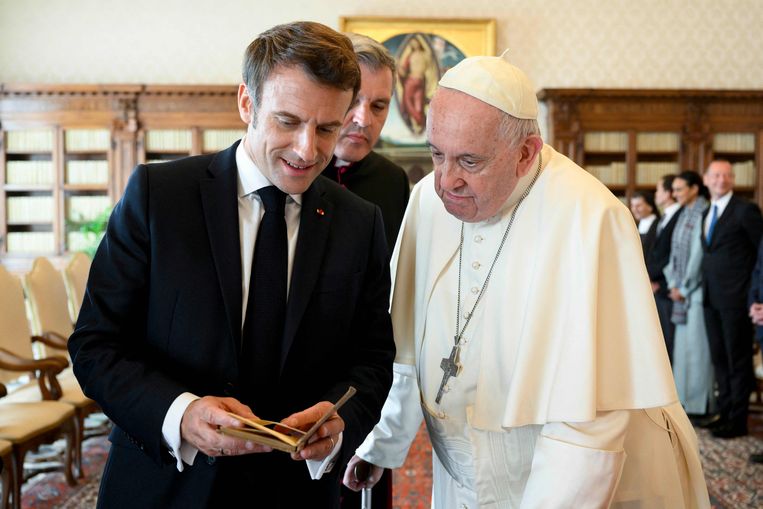It’s rarely good news for the Vatican if’paper(“The Pope”) is taking to Twitter in Poland. Pope John Paul II (1978-2005) was so popular in his Catholic homeland that his successors could not do well. But now, Pope Francis was very upset, as some Poles said earlier this week: he accepted a book that may have been stolen from Poland during World War II. After two days of speculation in the Polish (social) media, Culture Minister Piotr Gliński joined the discussion. On Wednesday, he said the book “was not stolen from Poland”.
The gift from French President Emmanuel Macron, who was visiting the Vatican. The Pope gave an early French version of to eternal peace (1795) by Immanuel Kant. The book was printed in 1796 in Koenigsberg, home of the Enlightenment philosopher and present-day Kaliningrad. In the short work, Kant put forward some ideas about achieving a lasting peace. Macron must have thought of a suitable gift in times of war.
This turned out differently in Poland. The stumbling block was a stamp on the book’s title page. The book shows that the book bears the stamp of the “Academic Reading Room of Lwów”, a student association that was active in the city university between 1867 and 1939. Lwów is the Polish name for today’s Lviv in Ukraine. In Poland, there were immediate voices that this book had been stolen during World War II, which led to a slight media storm.
theft
Peace is now back. But speculation about looted art does not come out of nowhere. Between 1920 and 1939 Lviv was under Polish rule. Before World War II, it was a multicultural city with diverse communities, the largest being Poles, Jews, and Ukrainians. During the war, the Soviet Union (1939), Nazi Germany (1941) and again the Soviet Union (1944) occupied Lviv.
The war brutally ended the multicultural character of the city. Many residents were killed or deported. During the same period, the Soviet Union and Nazi Germany extensively looted artwork and other valuable heritage from Central Europe. To this day, Poland is missing about half a million artworks that disappeared during that period.
Hence the raised eyebrows at the seal in Kant’s book, which led to a small media storm. Poland’s state TVP devoted an item on Tuesday’s breakfast program to various theories making the rounds. Two Polish research institutes suggest that the book may have been stolen by the Nazis. Right-wing propaganda is less subtle in the discussion, and one congratulated Macron on “trading in stolen goods.”
Macron punching bag
A Swiss investigative journalist said he had evidence that the antique book was bought in Paris and was in France before 1900. For now, this fanatical falls on deaf ears. This may have something to do with the fact that Macron is a favorite boxing bag of Polish publicists (especially from the right), along with fellow German Olaf Scholz. Like the government in Warsaw, they feel that both statesmen are not very decisive in their response to the Russian invasion of Ukraine.
Macron’s efforts to find a diplomatic solution to the war in Ukraine met with little understanding in Warsaw for months. After all, based on their history with Russia, they know that negotiation is pointless, as it seems in the Polish capital. In any case, the Poles grumble frequently about the lack of historical awareness of Western Europe in this conflict. This photo emphasizes a diplomatic miss with a two-hundred-year-old book.
The Polish government says it is aware of the discussion, but has not yet intervened. The head of a think tank close to the government suggested on Tuesday that the book’s origins should be investigated further first. There are also voices that take it back, asking an inescapable follow-up question: For whom?

“Creator. Award-winning problem solver. Music evangelist. Incurable introvert.”







More Stories
British military spy satellite launched – Business AM
Alarming decline in the Caspian Sea
Lithuania begins construction of military base for German forces